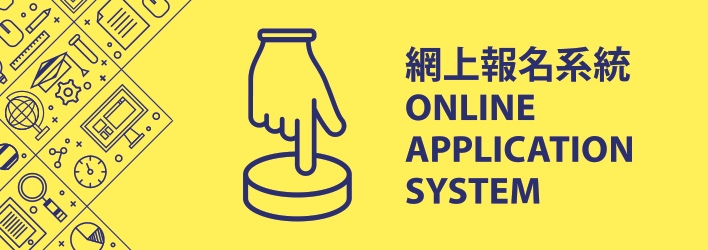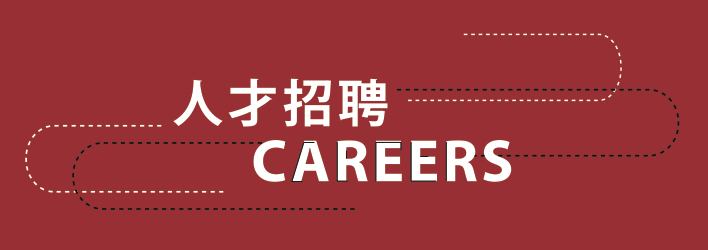Hosted by Macau University of Science and Technology, the fourth conference of the first academic committee of State Key Laboratory of Quality Research in Chinese Medicines was successfully held on December 1st, 2014 in MUST. The conference abides by “Administrative Measures for Construction and Operation of State Key Laboratory” which is issued by Ministry of Science and Technology. The attendees included Mr. Cheang Kun Wai, member of Administrative Committee of Science and Technology Development Fund, Ms. Ip Kuai Lam, Senior Manager of Science and Technology Development Fund, Mr. Zhou Ligao, Chairman of University Council of MUST, Mr. Chen Keji (China Academy of Chinese Medical Sciences), Director of the first academic committee of State Key Laboratory of Quality Research in Chinese Medicines, Mr. Cheng Yung Chi (Yale University), Committee Member of the first academic committee of State Key Laboratory of Quality Research in Chinese Medicines, Academician Sun Handong (Kunming Institute of Botany, Chinese Academy of Sciences), Prof. Chen Ji Wang (Taiwan University), Prof. Chen Shilin (Institute of Medicinal Plant Development), Prof. Ye Xinshan (Peking University), Chair Prof. Liu Liang (Macau University of Science and Technology), Prof. Li Shaoping (University of Macau), representatives of Science and Technology Development Fund and members of two laboratories.
On behalf of Macau SAR government and two universities, Mr. Cheang Kun Wai, President Liu Liang and Vice President Ma Xuyuan addressed the meeting. They expressed their constant support to the development of the key laboratory. In his welcoming speech, President Liu Liang said that the key laboratory has been developed for 3 years under the guidance of the academic committee. It successfully passed the mid-stage assessment in January 2014, which led the lab to the stage of academic development. Due to over 170 teachers and students’ joint effort, amazing progress has been made. With the support of the university, the laboratory should persist in quality research and innovation in Chinese medicines, improve its research objectives, focus on critical technology, diseases, and medicines, combine theory, technology, method, standard and medicine to carry out innovative and cooperative research involving different academic subjects, and accomplish more original research achievements with independent intellectual property rights. It’s hoped that the key laboratory will turn into an internationally well-known research institute of Chinese medicines. Mr. Cheang Kun Wai said that although it has been a short time since the establishment of the state key laboratory, remarkable progress has been made in building the research team, improving research conditions, carrying out research programs, and achieving research objectives. Compared with the similar state research institutes in terms of technology platform construction, our laboratory is leading the way. Its achievements have been recognized in the mid-stage assessment. It’s hoped that in the future, it will overcome its limitations, distinguish the research objectives, understand the position of the laboratory, and persist in the main developing direction.
Prof. Jiang Zhihong and Prof. Wang Yitao presented their work reports after the welcoming speeches. Prof. Jiang introduced the new development of State Key Laboratory of Quality Research in Chinese Medicines within a year, including passing the mid-stage assessment successfully, improving research conditions, building academic teams, achieving fruitful results in four key research areas with a series of scientific discoveries, research papers, international patents, and so on. The laboratory has received financial support from Science and Technology Development Fund – about 32 million MOP, to carry out research programs in cooperation with the government of Mainland China, pharmaceutical industry from Hong Kong and the Mainland and oversea enterprises. The academic achievement of the laboratory is outstanding: more than 100 articles have been published in Chinese and foreign academic journals, within which 94 were SCI papers. It is worth noting that important findings have been published in major academic journals of international medicine and chemical research such as “Analytical Chemistry”, “Organic Letters”, “Scientific Reports” and famous scientific journal “Science”. In addition, the laboratory has gained 25 Australian patents, 5 Chinese patents, Special Prize and Second Prize of Natural Science Award from Macao Science and Technology Award. A professor from the laboratory has been chosen as the guest professor in Yangtse River Scholar Program of Ministry of Education. In 2014, joint laboratories and joint research centers were established with 3 well-known teaching and research organizations from the Mainland. There were a series of seminars, training classes and symposiums in the same year, especially the establishment of the Specialty Committee on Immunology of Traditional Chinese Medicine of the World Federation of Chinese Medicine Societies and the first annual meeting. The development of the state key laboratory gains recognition and applause from the academic committee. After expressing their sincere gratitude to the committee for its support, Prof. Liu Liang and Prof. Wang Yitao, on behalf of the two affiliated institutes, said that the state key laboratory will learn from the suggestions and strive for its further development.
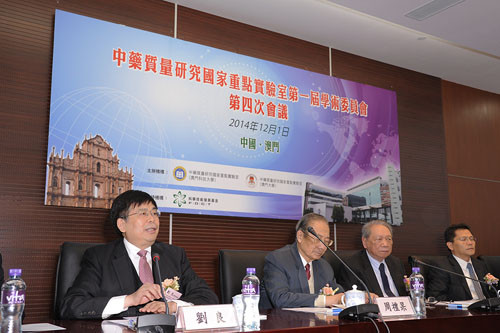
Welcome speech by President Liu Liang, Chair Prof. of MUST
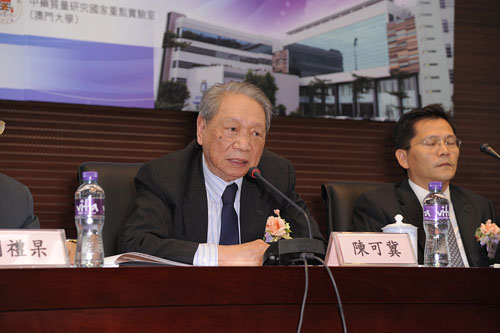
Mr. Chen Keji, Director of the first academic committee of State Key Laboratory of Quality Research in Chinese Medicines deliver the speech
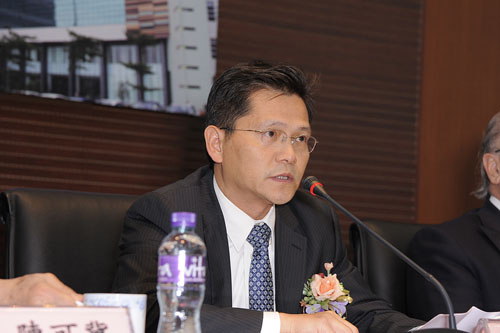
Mr. Cheang Kun Wai, member of Administrative Committee of Science and Technology Development Fund deliver the speech
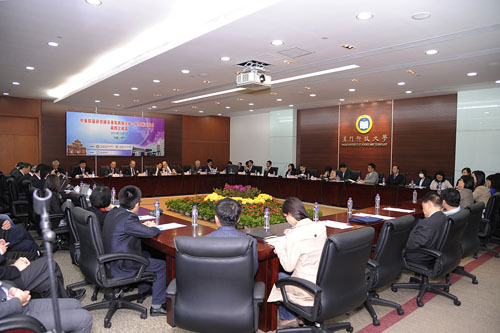
the fourth conference of the first academic committee of State Key Laboratory of Quality Research in Chinese Medicines
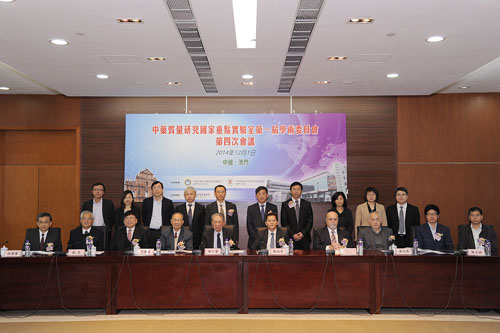
Group photo of the fourth conference of the first academic committee of State Key Laboratory of Quality Research in Chinese Medicines




